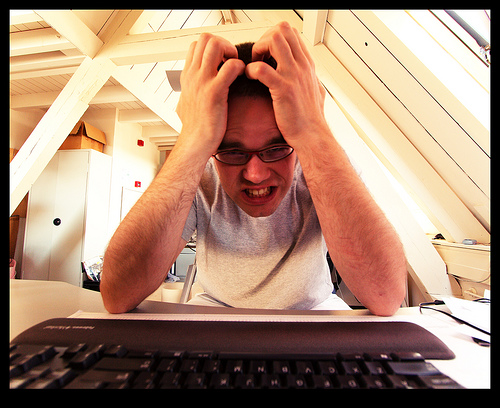Write Yourself out of Depression: Practical Self-Therapy for Creative Writers
Today’s guest post is by author and writing instructor Rayne Hall.
Do you feel like you’re trapped in a dark hole of morass, sinking deeper and deeper, the mud rising to your hips, your chest, your throat? Is despair smothering you like a heavy blanket? Is your own life moving past you like a train, and you are forced to watch and cannot board? Has crippling lethargy wrapped its tentacles around you so tightly that you cannot move, sucking from you all energy and the will to live?
If you want to get better, to feel alive again, if you want to step out of this darkness and take control of your recovery, you can use your skill with words to help yourself.
I’ve been there. I understand. Together with Alexander Draghici, a psychologist specialising in emotional disorders, I’ve written a book to guide writers like you out of the dark hole.
You can be your own therapist and at the same time improve your fiction-writing skills.
How to Describe Your Emotions
When you suffer depression, your brain produces intense negative emotions: grief, anger, resentment, fear, inner pain, regret, shame, guilt, worry, envy, self-loathing, and more.
As a writer, you have a powerful tool to reduce these emotions: simply use your descriptive skills. The effect is astonishing and fast.
Here’s how you do it:
Whenever you feel bad, identify the emotion. Observe where in the body you feel it and how it feels.
Describe it. Use a simile (a comparison with something else).
“I experience . . . It feels like . . .”
“I experience. . . It feels as if . . .”
Here are some examples from my own notes:
“I experience fear. It feels like a giant iron fist clutched around my chest, squeezing the air from my lungs.”
“I experience anger. It feels like hot acid rising from my stomach into my throat.”
“I experience worry. It feels as if I had an ugly toad squatting between my shoulder blades.”
“I experience inner pain. It feels like a knife ripping inside my gut.”
By labelling and observing your emotions, you’re objectifying them. They lose their power over you.
At the same time, you’re becoming a better writer. You’re creating vivid emotional descriptions that you can use in your fiction. In years to come, whenever a point-of-view character experiences one of these emotions, you can look up your notes on how it felt to you. You’ll have a fresh, original description that will dazzle your readers with its raw, vibrant authenticity.
Don’t worry if you can’t come up with brilliant prose. Just describe what you feel.
From My Personal Experience
I discovered this technique after a session with a cognitive-behavioral therapist who advised me to label and observe emotions so I would recognize them.
This was tremendously helpful—and I immediately saw that this therapy could double up as practical writing research.
It got to the point where I actually welcomed the negative emotions. (“Ah, jealousy! Great, that’s a new one for my collection.”) I felt pleased about the bad feeling . . . and that immediately gave me a boost.
Those phrases have been so useful in my fiction writing. If you read my short stories and novels, you’ll come across sentences like these:
“The iron fear of fist clutched around his chest and squeezed the air from his lungs.”
“Anger rose like hot acid from her stomach.”
“Worry squatted like an ugly toad between her shoulder blades.”
“Pain ripped like a knife in his gut.”
Sound familiar?
Book reviewers often praise my skill at conveying emotions in a fresh, vivid way. One reviewer even quoted the sentence about the ugly toad as an example of my original writing.
Expert Advice from Psychologist Alexander Draghici
For a person who struggles with depression, getting a handle on those negative emotions can sometimes feel like a herculean task. Depression is often perceived as a deep and heavy fog that clouds your judgment and prevents you from finding your way out. You feel “bad,” but you don’t know how to describe your emotion, and this will most likely cancel your ability to exercise control over your feelings.
By using writing as a therapeutic tool, you’ll be amazed to see how your once hazy emotions will slowly begin to take shape right in front of your eyes. In other words, you’re no longer fighting in the shadows but on an open field.
Think of it this way. People who struggle with depression tend to ruminate a lot. They spend hours thinking about various causes, factors, and consequences of their negative mood.
The main problem with rumination is that it leads nowhere. You’re like a lost explorer, going in circles, thinking that this path or the next one might get him out of trouble.
Writing down your thoughts and emotions is the equivalent of climbing atop a tree in order to get a better sense of direction. More specifically, it gives you the opportunity to temporarily separate yourself from that confusing mix of negative thoughts and emotions and become an outside observer who can clearly see the big picture.
Metaphorically speaking, the act of putting your emotions on paper symbolises your attempt to externalise them. Even more, by describing each and every one of your troubling feelings, you make an effort to understand the very core of depression, thus taking the first steps toward healing.
Just like the profiler who manages to sketch accurate portraits based on vague descriptions, you too can create a detailed image of your negative emotions just by putting a few words on a piece of paper. In fact, you can even improve this exercise by painting/drawing a picture for every emotion that you’ve described.
Do you struggle with feelings of depression? Have you tried writing down descriptions of how you feel? Has this helped you?
Rayne Hall is the author of more than sixty books, mostly dark fantasy and creepy horror, as well as the editor of the Ten Tales fantasy and horror anthologies.
 Visit her website or follow her on Twitter for writing and publishing tips.
Visit her website or follow her on Twitter for writing and publishing tips.
Subscribers to her newsletter for writers get a free pdf workbook Grow Your Unique Author Voice.
Write Your Way Out of Depression: Practical Self-Therapy for Creative Writers is available for Kindle and in paperback.












So glad to see a book on this subject. It reminds me of how Thomas Wolfe poured all his experiences, traumas and depressions into his novels. It’s as if creativity is a built-in weapon against depression and destructive emotions.
I do have a question for Alexander. I’ve been dismayed at how hurts from years ago, even decades, keep haunting me. It’s enough to enrage me at times, sometimes out in public. Apparently there are wounds that even time won’t heal. In fact they seem to inflame still more as the years go by.
One of my favorite songs is “Get Over It” by the Eagles, but I’ve found this a lot more easily said than done. The people in question are long out of my life, and I don’t know where they are or if some of them are even still alive. Any advice for cases like this? Thanks.
Hi Doug,
I think the value of the message ‘Get Over It’ is as a reminder and motivation to try to get over it.
Unfortunately, when outsiders tell us ‘Get over it’ (depression suffers often get told ‘Snap out if it’) it just shows that they don’t have a clue what we’re going through.
If it was so easy, we would have ‘got over it’ or ‘snapped out of it’ long ago. 🙂
Rayne
Thanks, Rayne. Is there anything you & Alexander could recommend as far as letting old hurts go? I forgive the people involved, yes, but the forgiveness needs to stick. Thanks
Hi Doug,
Many years ago, religious and spiritual advisors, friends and authors of self-help books all urged me *forgive* the evil person who had done me so much harm when I was a child. They told me this was important for my mental, emotional, spiritual well-being.
I tried repeatedly, with different exercises, but could not. Not really, not deep down.
Then when I was ill with depression and getting psychotherapy, I told the therapist about that person, with just a brief outline of how he’d messed up my life. I said I knew that I needed to forgive him, and asked her for advice how I might achieve this.
She laughed. (I hadn’t expected that!)
And then she said, “Perhaps there are some things shouldn’t be forgiven.”
(I hadn’t expected that either!)
I was completely startled. I didn’t need to forgive the bastard?!
I had an expert’s permission to simply not forgive?! Wow! Suddenly a huge weight lifted off me. It was such a relief.
And then some months later, when I thought about that evil bastard, I discovered that I had actually forgiven him. Without consciously trying to, I had been able to let go of the burden of resentment.
All it had taken was the assurance that it was acceptable to not forgive. The permission to not forgive freed me to truly forgive.
Maybe this is something for you to think about. So I’ll just repeat what the therapist told me: “Perhaps there are some things that shouldn’t be forgiven.”
Imagine that you can hear me laugh, like the therapist did.
Enjoy the freedom to forgive or not forgive – both are good and right!
Ya, I had a similar experience with my current counselor, I had always thought to get over what had happened you had to go back and relive all that crap. My counselor did the laugh too and said that’s not how we do it…
Total relief and for once the hope that therapy could help.
I’m glad you brought this up because it creates the perfect context to talk about preventing relapse.
Whenever I work with someone who’s struggling with depression, I always go WITH his/her depression, as opposed to going AGAINST it. In other words, instead of running away, trying to forget or fencing ourselves behind tall walls, we should invite her (depression) in for a cup of coffee. Let her know that it’s ok to visit from time to time, because we know how to handle her. This is the reason why Rayne and I put so much emphasis on describing your emotions and even turning them into the villains of your story; villains that are destined to be defeated, regardless of how often they choose to make their presence noticed.
Aside from the strategies described in our book, I highly recommend “Feeling better, getting better, staying better” by Albert Ellis.
Hi Doug,
I have a writing strategy you may want to try. I didn’t include it in the book because it’s a difficult one, requiring advanced fictioneering skills as well as a challenging shift of attitude. Try it; you may be able to do it and it may work for you.
Imagine your emotional health problem (in your case, the anger issue) as a fiction character.
Flesh this persona out the way you would develop a fiction character for a novel. For example, I imagine your Anger is male, tall, muscular, with short hair and a loud voice, casually dressed, assertive, passionate, opinionated, courageous, impatient, and with an unfortunate tendency to inject himself into situations and conversations where he’s unwanted and hasn’t been invited.
Important: Develop this person as a ‘good’ character, one of the Hero’s allies. But a flawed one. (His tendency to barge into situations uninvited is a character flaw.) This is the real challenge, because you’ve probably cast him as your enemy.
When he’s fully developed (as fully as a major character in one of your novels), you can either write a letter from Anger to Doug, or a dialogue scene where Doug and Anger have a chat, perhaps while having a beer or while working on a project together.
Anger explains to Doug why he’s doing what he’s doing. He sees himself as Doug’s protector, helping him. Without him, Doug would make mistakes and fall prey to certain types of people and situations, so Anger steps in to make sure this doesn’t happen.
Doug can tell Anger that he appreciates the effort, but wishes Anger would find a different way to do this, such as warn Doug quietly of dangers instead of gatecrashing conversations.
You can have fun with this exercise. I’ve done it myself (with Depression, Anxiety and Resentment rather than with Anger) and found it wonderfully effective. But it’s difficult.
Rayne
What I forgot to mention: This exercise kind of what Alexander suggests, inviting Depression in for a cup of coffee instead of working against her.
View Anger as an ally character. 🙂
Very interesting, Rayne. I believe I even saw a whole movie of this not long ago–“Imaginaerum”–an old man’s dementia is personified as a wicked talking snowman.
I’ll give this a try and email you with how it came out.
Rayne, Alexander and Chris, thanks for a wealth of eye-opening information, and for the book recommend. It reminds me that there’s always hope.
Questions, anyone? Alexander and I will reply to your questions about Depression and Writing Therapy. Post your questions here in the comments section, and we’ll reply. (Today and tomorrow.)
Great post! I don’t really have questions, just an observation about my process. When I was going through a rocky time many years ago, the overwhelm and anxiety I felt emerged as a novel. Now that life is better, I feel less motivation to write because I don’t want to stir the pot. But I can attest that when I am faced with some crisis I do turn to my writing to work out the issues.
Thanks for the reminder that our negative feelings can be transformed into art.
That’s interesting, Avril. Most people find that overwhelming negative feelings sap the motivation to write. It’s good that your mind is able to to use negative feels as both fuel and inspiration.
Rayne
There’s no such thing as ‘pure’ depression. Most people who struggle with this issue will most likely have to deal with symptoms of anxiety as well. Luckily, the same techniques you use for dealing with the negative emotions associated with depression can also be used to tackle anxiety. For example, turning your negative emotions into fictional characters that you can put in a story of your own works equally well in both depression and anxiety.
As for ‘stirring the pot,’ my advice would be to stir it until it becomes crystal clear. Our mind’s natural tendency is to ‘bury’ every unpleasant or traumatic event that has troubled us in the past. Some speculate that the reason why our brain uses this strategy is to keep away anything that might ‘poison’ our thoughts and emotions. That, of course, until it figures out what to do with it. It’s just like putting a lid of a barrel of toxic waste.
Since you managed to overcome your struggles, I’m guessing your mind already has a set of healthy coping strategies that you can use in case your problems start bothering you again. 🙂
Funny about that. I went to a new doctor last year who took me off of dairy, sugar, and egg products. I am a celiac, so I’ve been off of gluten for 16 years. Once I was off of dairy my anxiety issues (and stomach issues) went away. Was able to leave my psychotherapist after seeing her for seven years. When I feel stressed I swim or walk or paint. But it was weird how a food allergy made me feel like my life was falling apart. Of course, stomach problems will do that, when I was an undiagnosed celiac I could barely think straight. I worry that too many people are diagnosed as depressed when really there is a health issue such as diet or lifestyle. I am grateful for the therapy and the writing because it kept me going through very tough times.
This is an interesting turn of events indeed. How an undiagnosed or misdiagnosed condition can lead to emotional issues.
Your example clearly illustrates why doctors and psychotherapists should work together and approach each case from all possible angles.
This is a fantastic post. I too see a CBT who has encouraged me with the same advice. Your idea of putting descriptions on the feelings is brilliant and I think I’ll use that tip in abundance. Thanks for bring open about your experience and how it’s helped you become a better writer.
Big fan of yours in Arizona USA
Hi Melissa,
I find putting descriptions on the feelings makes the exercise more interesting and fun. (As well as more useful for fiction writing.)
I want to be open about my experiences – and I talk about them frankly in the book – because then people who suffer from depression know that I understand them, and that I’m not just giving theoretical textbook advice.
I’ve been there, gone through it, and come out in the light. When people see that could do it, they can believe that they can do it, too.
Rayne
Great post! Whether it’s depression or soaring joy, I have found experiencing it & writing about it while you’re still “in the moment” helps not only with vivid emotional portraiture but seems to plus up my empathy with others. Feeling & attending to those feelings, sensitizes me to what others in similar situations may be feeling. Even after I’m in an emotionally different place, I can empathize more quickly with others feeling (you fill in the blank) emotion, if I’ve paid enough attention to capture it while I’m there.
Thanks for sharing, Rayne.
Hi Dirk,
I think you’re right. Understanding our own feelings, what triggers them and what they do to us, helps us understand other people and their emotions better.
Until I became ill and consciously learned to observe and study my emotions, I wasn’t very good at reading other people’s feelings. Actually, I was quite blind to them. I’ve certainly developed more empathy.
And of course understanding our own emotions helps us create convincing character emotions, which is useful for our fiction.
Rayne
As a writer who suffers chronic depression, I agree that writing about your feelings is one of many writer’s tools you can use to combat your mood, and Rayne covers many of them in her book (which I rated 5 stars on Amazon). That being said, and Rayne discusses this in her book, if you suffer extended periods of depression you should consult a physician. Writers tools only work for the current phase, but you will suffer again and you may find the tools not as effective as in the past. You shouldn’t abandon them for medical help, it’s the combination that can help bring you to a more level mood as time passes.
I say this because Americans may lose their health care over the next two years and the time to see a physician is now.
Hi Phillip,
Actually I find that these exercises get more effective with repetition. 🙂
But I agree, if someone suffers serious depression, it’s good to get a diagnosis from a physician, and if appropriate get treatment, too (if available – that’s a bleak prospect you’re painting for the near future in the USA).
The strategies actually work well in conjunction with medical or alternative treatments, so using one doesn’t exclude the other.
Rayne
Hey Phillip,
I’m glad you brought this up!
Some people tend to label physicians and psychiatrists as ‘the minions’ of Big Pharma, whose sole purpose is to make money out of our pains and sufferings.
Personally, I hold a slightly different opinion. There are cases when, as a therapist, you simply can’t make any progress because your client lacks the energy and motivation to get involved in the process. There are also cases when people with mild depression receive unnecessary medication.
Drug therapy may not be a perfect solution (with all the side effects), but it’s among the best we have at this point. I believe the future of healthcare (physical and mental) relies on eclectic approaches. Instead of getting stuck in trivial ‘conflicts’ (CBT vs. psychoanalysis; therapist vs. psychiatrist), I think we should make the client/patient our top priority and use whatever combination works best for him/her.
I have to comment on this.
I have had chronic depression most of my life. Recently, like within the last year, I completed menopause and had the WORST deep, unrelenting depression I have experienced.
I would have never thought to describe the feelings and emotions and make it work for me.
Thank you so much for this post.
I also went and immediately signed up for your email list and bought the book.
(It looks like I accidentally posted my reply in the wrong place, so I’m trying again.)
Hi Chris,
I still have the menopause ahead of me – but anticipating it any moment now. I wonder if this will trigger a relapse into depression for me. I hope not, but at least I’ll be prepared and know what to do.
Will you let me know how you get on with the strategies in the book? My email is at the end, in the ‘Dear Reader’ section.
Rayne
Hi, Rayne. I recognize my symptoms in what you describe. I feel tired all the time! I have no ambition to do housework or laundry or anything for that matter. I used to love being on the go, and now I never leave my apartment unless I really must. At what point do you think it is being down in the dumps or real clinical depression? My doctor believes I am depressed and has put me on a light dosage of an antidepressant, but has not suggested a therapist. I’ve been wondering if I should. I don’t know why I have been feeling this way, I can’t pinpoint any issue why I would. I am happy to see you deal with this as it applies to writing. I have been having trouble sitting down and doing anything productive. Maybe these feelings will help with that.
Hi Chris,
I still have the menopause ahead of me – but anticipating it any moment now. I wonder if this will trigger a relapse into depression for me. I hope not, but at least I’ll be prepared and know what to do.
Will you let me know how you get on with the strategies in the book? My email is at the end, in the ‘Dear Reader’ section.
Rayne
Oops, somehow my previous comment copypasted and posted itself where it’s not wanted. Apologies, Rebecca!
I’ll write my real reply to you in a moment.
Hi Rebecca,
What you describe certainly sounds like ‘real’ depression to me. Since your doctor thinks so too, I think you can assume the diagnosis is correct. 🙂
There isn’t actually a clearly visible boundary between ‘being down in the dumps’ and ‘real clinical depression’. The main difference is that ‘being down in the dumps’ usually has a cause (or combination of causes) and goes away after a while. The illness of depression, on the other hand, doesn’t always have an identifiable cause, and it just won’t go away by itself.
Whether you’re just down in the dumps or suffer from the illness of depression, the strategies in the book can help either way. If you like, I’ll send you the ebook free. (Maybe you can review it on Amazon or somewhere?)
Regarding medication and therapy. Medication really helps some people. Depression is an illness of the brain. The brain sabotages itself, destroying certain chemicals it needs to function emotionally. The meds stop the brain from doing that. (This is a very simplified explanation in layman’s terms. Alexander can probably explain it better.)
Do you find the meds help you? I know that’s difficult to assess, because there’s no knowing how you would feel without them, but it’s worth observing and telling your doctor.
For me, medication (of the SSRI type) seemed to help in the most severe phase. But once I was over the worst, I found that I actually made a better recovery without them.
Therapy, on the other hand, I always found extremely helpful, but in the severe stages and later when I was largely recovered. The therapists initially helped me to cope with the most terrifying ordeal and to survive day by day. Later, they guided me to restructure my thinking, to prevent relapses and to generally improve mental and emotional state.
See how you get on with the exercises in the book. If you find them helpful, therapy would probably be good for you, if you can get it. You may want to ask your doctor about it.
If you want the ebook, email me. (If you don’t have my email, contact me through my website, raynehall.com)
I look forward to hearing from you.
Rayne
Reading this reminded me that my own issues were with anxiety and I finally discovered after 7 years that the anxiety was a result of food allergies. Keep an open mind! Go with what works for you.
Mental/emotional issues caused by food allergies! It’s frightening that you didn’t get the correct diagnosis for so long.
I knew that being a celiac meant that dairy could be a problem. I was being stubborn because I loved my cheese and milk! 20-20 hindsight…
Hey Rebecca,
Sorry to hear about your struggles. I’ll try to help as best as I can even though I have little details about your specific issues.
One of the main strategies therapists use to combat depression is behavioral activation. In other words, we identify situations (hobbies, activities) that the client used to enjoy or new situations that he/she might enjoy, and we help him/her get involved (gradually, of course). In a sense, behavioral activation relies on the ‘fake it ’til you make it’ logic. At first, you might not feel the positive effects, but you have to keep on trying despite feeling down in the dumps. Also, I highly recommend Strategy 3 (Paint beautiful word pictures) and Strategy 4 (Venting in your journal) from our book. It will help you stop ruminating and see the bright side of things. 🙂
As for seeing a therapist, you don’t have to wait for your doctor to suggest it. I don’t see why he/she would be against this approach. Not as an alternative to medication, but as an additional source of healing.
An excellent article. While I don’t suffer from depression, like everyone else I’ve had my share of challenges and these find their way into writing. I have resolved many a stress through turning my antagonists (real) into hapless characters, getting into their heads and finding how they tick. I was speaking with a fellow poet a few days ago and it came to mind that she could run a creative writing group or workshop for people grappling with depression. She liked the idea!
Hi Susannah,
Using our real-life antagonists as inspiration for fiction villains is a good strategy. We can either reveal their evil on paper (in much disguised form of course, so they won’t recognise themselves and sue us for libel) or we can let them come to a painful end, inflicting all the punishment on them that they deserve. Whatever is most fun and therapeutic. 🙂
A creative writing group or workshop for people grappling with depression is a great idea. Especially for poets. Writers seem more likely to get depression than ‘normal’ people (apparently there’s a genetic link between natural writing talent and susceptibility to depression), and poets are the highest risk group. So there are probably many poets who suffer from depression.
The main obstacles to such a course or group or workshop will be that many people don’t want to admit that they have depression (they perceive it as a stigma to be mentally ill), and that while they’re grappling with depression, they often don’t have the willpower, energy and motivation to go out and attend the meetings. They may want to, they may mean to, but they may not turn up. 🙁
Still, it’s worth trying, because it’s a very worthwhile cause.
Rayne
9999999999999998
😀 this was typed by my cat Sulu. He clearly wishes to contribute to the discussion, though I have no idea what it means.
He’s talking himself into believing he is a 9, then admitting he really only is an 8. This is a demonstration in psychology to show how important it is to accept who you are. Tying in with this discussion …
😀
Or maybe the 9’s are mice – body and tail. He’s thinking of lots of mice. And the 8 is a pair of eyes – his eyes watching the mice.
This explanation lacks the psychology tie-in. But then, Sulu is the most un-depressed cat you can imagine. He’s always happy, content, relaxed. He doesn’t bother with anger, sadness, disappointment, resentment or any of the negative stuff. He simply enjoys life as it is. I think he’s found the secret of happiness. 🙂
Fantastic post, book, and response thread. When we’re depressed we are also isolated and this kind of supportive sharing, coupled with excellent advice has been very helpful to me at this time. Writing helped me tremendously when my father was diagnosed with cancer–and again when he was dying. I am going to try some of these techniques to get through the current morass I find myself in.
Hi Carole,
Sharing is good. There are limits how much we want, can and ought to share in a public forum – after all, we don’t want to attract internet trolls in search of vulnerable victims – but just knowing that there are others who experience the same is a great relief. Well, not exactly the same – because everyone’s depression experience is different – but similar enough to understand.
It also makes us feel more ‘normal’. Normal isn’t quite the word I’m looking for here, but you probably know what I mean. Not being the only one who’s dealing with this, knowing that many others go through it it too, realising that it’s actually a common problem among writers… this can be tremendously helpful. I certainly found it very helpful when I was stuck in the pits.
Carole, I think you have my email address. Email me to talk beyond public-forum boundaries.
Rayne
Writing about my emotional problems (based on emotional abuse and gaslighting from my family) in vivid prose sounds like an excellent idea, but I find that focusing on such problems feels overwhelmingly painful, so painful that I can write about it only so much before I’m scared away from it.
Hi Mawr,
You’re right, when you focus on problems, and keep thinking and ruminating and writing about them, it’s likely to make you feel worse instead of better. If your brain engages with all the negative stuff, it produces more negative thoughts and unhappy feelings, and that’s not desirable. 🙂
You may actually find our book useful, because it teaches you to use those problems and memories as fuel instead of as a focus. If you’re interested, would you like to read the book and review it on Amazon or somewhere? Then I can send you the ebook free as a reviewer copy.
Rayne
I’d love that. Thanks. Do you have a link?
Writing about my emotional problems (based on emotional abuse and gaslighting from my family) in vivid prose sounds like an excellent idea, but I find that focusing on such problems feels overwhelmingly painful, so painful that I can write about it only so much before I’m scared away from it.
It looks like your message posted twice, under different name variations. I’ve already replied to the previous one.
This is actually a very great idea. Thanks for sharing it with us Rayne and I have to admit that it definitely has some merit to it. I find that whenever I’m feeling emotional, not necessarily depressed, that the words just seem to pour out. Based on what I’ve learnt from my few Psychology classes, it’s a quite therapeutic approach as well as it allows the person to channel that negative energy into something that is more positive; kind of like a killing two birds with one stone type of thing.
Couldn’t agree more! In fact, I once saw an interesting Ted talk about how humans slowly began introspecting and thinking about themselves, right around the time they acquired complex linguistic skills.
The speaker also suggested that by analyzing our language, we might be able to predict our future mental health.
Here’s the link: https://www.ted.com/talks/mariano_sigman_your_words_may_predict_your_future_mental_health?language=en#t-81549
Yes, I think that’s what it is – we achieve two things at once, we therapise ourselves (I’ve just made that word up – we writer’s are allowed to invent words, aren’t we?), and at the same time we make constructive progress with our writing.
I’ve always felt better doing ‘writing’ than ‘just therapy’. Knowing that I was doing something constructive made me feel better.
By the way, I wonder where the phrase ‘killing two birds with one stone’ comes from. Maybe it originated in a time long ago when people used stones to hunt birds for food?
I have often found over the years that writing when I am depressed or extremely happy is when I do my best work. I think this helps us to not only be introspective but also to get in touch with what others may be feeling as well.
Hi Annay,
That’s interesting. You do your best work when you’re either depressed or extremely happy? So extreme emotions stimulate your writing creativity?
Rayne
Writers and artists, in general, have a talent for transforming pain and sorrow into beauty. Keep using this skill, and you will create beautiful things! 🙂
I’m not a professional writer but I love writing and I do that when I have the urge to express the accumulated emotions which have’t found their way out.
This articles comes to prove that it’s really something that works. Writing down the feelings. The therapist confirms that fact.. who am I to doubt a therapist’s opinion? 🙂
It helped me not once, writing my worries away. And thanks for letting me know that it’s a common practice, not something I invented 🙂
Two reactions on this post.
1. I read a book by Roberto Assagioli (27 February 1888 – August 1974 – Psychosynthesis – which described various ways of using creativity or art in order to improve psychological wellbeing. One of them was way to complicated to me – write two separate pieces of music, one sad and one cheerful, and then mix them to the pint where the cheerful one dominates the sad one. But maybe we can do it by mixing songs written by other people?
2. I experimented a couple of times with children – my own, when they were younger and children of various age at a foster home – developing stories based on children’s drawings. It is amazing and combines a couple of elements: a) displaying emotion via a drawing, b) turning and emotion into a story and c) combining your own emotion with the emotions of the others into something new.
Writing helps, even if it is not a story but a simple diary.
Hello Rayne,
I thoroughly enjoyed reading this article. Considering the depression I have been experiencing, this really hit the spot. The way you described depression was beautiful and digestible. I really can’t stress enough how perfect the timing is for me to read this.
I have also observed my emotions and feelings and turned them into metaphorical descriptors. Both in my computer and my notebook. Lately I haven’t practiced it as much, and I have noticed a lot more presence of being blocked with my writing. Is there a particular technique you use or meditation you prefer when doing this exercise?
Again, I just want to say thank you so much for this. It is perfect timing.
Cheers, All the Best,
Dylan Hunter
“The act of putting your emotions on paper symbolises your attempt to externalise them.” This’s absolutely right! I discovered that writing is a sort of therapy when I’ve started my first blog 8 years ago. A few weeks ago I felt really sad, lonely and angry because my relationship wasn’t working. I wrote a short story that really helped me go through this situation.
Brilliant post! I love that this opens up a discussion of depression, which I feel is a taboo subject of sorts. I love the advice given about writing down your feelings using similes. I know how hard it can be to get your thoughts and emotions in order to where you can express them properly, but I would bet that this helps a ton. I am curious though as to what inspired you to write the self-help book. Was it going through depression yourself?
I have always found it really helpful to pen down my thoughts. Sometimes when I am trying to make sense of an occurrence or anything, in particular, I just take to writing. I found that expressing myself on paper helps clear my head. But really, how does understanding the core of depression help in the healing process?
Writing certainly helped me with my anxieties. It allowed me to reflect and gain perspective on what was happening within me as if I was another person.
In my early 20s I often felt powerless over the events in my life so I began putting my characters in situations, which they cannot control, and think on ways they can deal with them.
In this way I was not only pushing my mind into thinking positively, but I also felt better by helping them deal with their struggles. Weird…
It was like we were in this together.
On a side note, from my experience, the most compelling writers or characters are often the biggest bastards or the most damaged people.
Our imperfections give the flavor of our existence so it’s good to embrace them on some level.
What makes us broken is what makes us unique, i guess…
I am glad someone said something on this topic. A lot of people do not understand the seriousness of the depression. Just like you said they are told to ‘snap out of it’. It shows most people who have never experienced depression are not well-informed on the subject. I had friends struggling from the depression and I know it is not something to be underestimated. Finding a way to fight with the gruesome feelings from depression combining it with your passion of writing is something amazing. I feel lucky to have read this article, Rayne. I hope feelings of depression never ever come to you again.
I think that in any family, sooner or later various problems arise. It’s impossible without it, but sometimes quarrels cross the line and intervention is necessary. We had a very serious quarrel in our family and I started looking for online family therapy. Thanks to this service I picked up a good therapist with a lot of experience and virtually we began to solve our problems. He turned out to be a very knowledgeable person and gave examples of his own life, which was very surprising. I would like to say that after a few months my family and I were able to find a compromise and now we do not need a therapist! But thank you very much!!!